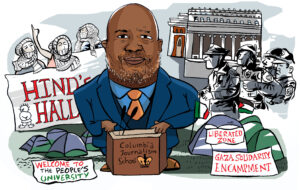
Trump’s Anti-Palestine Crackdown is Having a Chilling Effect on Free Speech
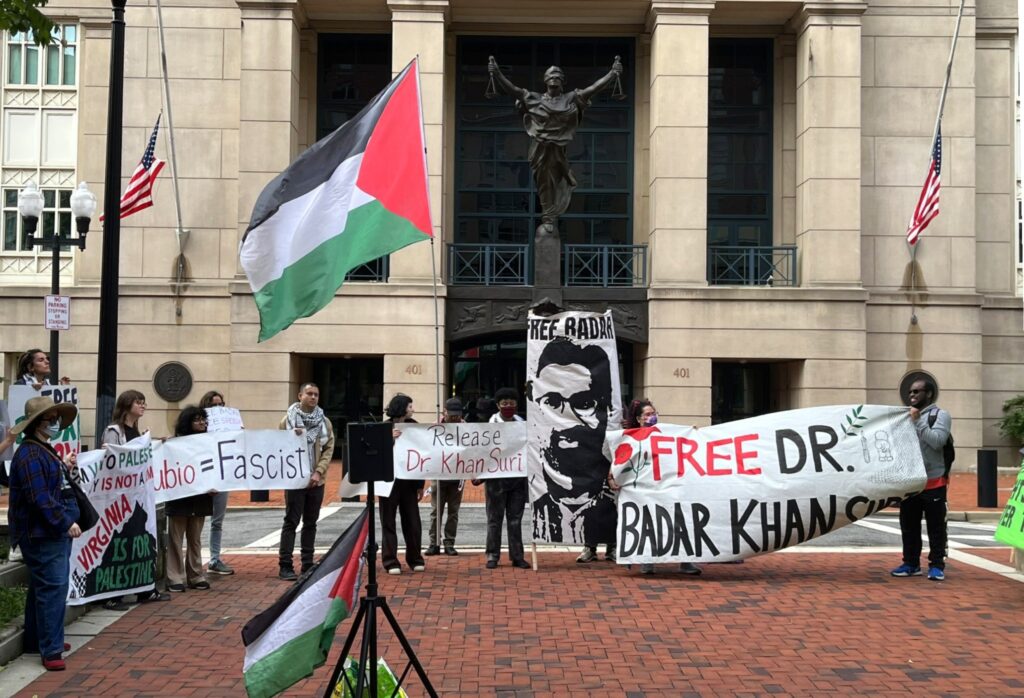
Courts in the United States have increasingly pushed back against the Trump administration’s sweeping crackdown on immigrant rights, particularly its attempts to detain and deport dissenters despite strong constitutional protections for political speech. The recent release of detained students and academics—many of them vocal about Palestinian rights—has brought renewed focus to free speech violations, including Dr. Badar Khan Suri, a Georgetown University postdoctoral fellow, who was released after 59 days by a federal judge from a Texas detention center on May 14.
“Dr. Khan Suri’s targeting, apprehension, transfer, and ongoing detention violate the First Amendment and chill other individuals who express support for Palestinian rights,” the American Civil Liberties Union (ACLU) of Virginia said days before its client, Khan Suri’s release. In the same vein, during his hearing, District Judge Patricia Tolliver Giles said Suri’s continued detention will cause “irreparable harm” to him and the public due to the “chilling effect” his detention has caused on First Amendment-protected free speech.
In a press conference at The Westin Alexandria Old Town, after the court hearing in Virginia on May 14, Mapheze Saleh, Badar’s wife, said, “Hearing the judge’s words brought tears to my eyes. I wish I could give her a heartfelt hug from me and my three children, who longed to see their father. Badar told me, ‘If my suffering in the detention center is because I am married to a Palestinian because I spoke up against the genocide in Gaza, then I should wear it as a badge of honor. What I endure here is a drop in the ocean compared to the pain of the Palestinian, who has been bombed, starved, and massacred for 585 days.’”
In the same press conference, ACLU Virginia’s Legal Director Eden Heilman said, “The Constitution protects us all, regardless of citizenship, from being targeted by the government for our political speech and our family associations. The Trump administration is trying to silence speech it doesn’t agree with by targeting people like Dr. Khan Suri and Mahmoud Khalil, but ideas are not illegal.”
Judge Giles emphasized that the government still had not submitted any further arguments or evidence for their allegations. She said, “I gave the government multiple opportunities to submit any type of filing to controvert these claims or support their opposition to these motions, and they declined.”
Dr. Badar Khan Suri was released following Mohsen Mahdawi, a Palestinian green-card holder and Columbia University student. Mahdawi was detained on April 14 during his naturalization interview and was later released on bail on April 30. Tufts University student Rümeysa Öztürk was released on May 12 after being arrested for 49 days for co-authoring an op-ed critical of Israel’s actions in Gaza published in The Tufts Daily. However, their legal fight continues. The first political prisoner under Trump, Mahmoud Khalil, a Columbia graduate and green-card holder who missed the birth of his first child, is still locked up in Louisiana.
The administration’s arrest of Khan Suri seems framed due to his relationship with his Palestinian-American wife, Mapheze, and her father, Ahmad Yousef, a former adviser to Ismail Haniyeh, former PM of Gaza and Hamas leader. The basis of his detention lay in a handful of social media posts. On March 17, Khan Suri was detained by masked officials from the Department of Homeland Security (DHS), and his J-1 visa was revoked. This followed Secretary of State Marco Rubio issuing a determination on March 15 that Khan Suri’s presence in the country could pose “potentially serious foreign policy consequences”.
No evidence was ever presented, and the academic was not charged with a crime despite the Trump administration publicly accusing him of having links to the Palestinian resistance group, Hamas.
Tricia McLaughlin, Assistant Secretary for Public Affairs in the Department of Homeland Security, stated on X that Khan Suri was “actively spreading Hamas propaganda and promoting antisemitism on social media. Suri has close connections to a known or suspected terrorist who is a senior advisor to Hamas.”
Khan Suri, who holds an Indian passport, completed his Ph.D. in Peace & Conflict Studies from Jamia Millia Islamia University in New Delhi. According to the ACLU, he faced religious discrimination, harsh detention conditions, and severe family trauma, despite his lawful US status, raising urgent concerns about human rights violations.
He was kept at a Louisiana detention facility, the same as Khalil and Öztürk. On May 6, a federal judge ruled that Khan Suri’s case of wrongful arrest would stay in Virginia and not in Louisiana, which was preferred by the Trump administration. At a Georgetown University panel discussion on April 14, Hassan Ahmad—Khan Suri’s lawyer—explained why so many cases from all over the country were transferred to Louisiana and Texas.
“The standard explanation we receive from ICE is for the detainee’s safety — that they need to move them due to bed space issues,” he said. “But that’s a lie! What actually exists in Louisiana and Texas is the Fifth Circuit case law, which is widely regarded as the most anti-immigrant and the toughest.”
The arrest of Badar and his fellow inmates in Louisiana has raised new questions about the First Amendment—whether free speech is really protected for everyone living within US borders. The government is not allowed, according to the First Amendment, to pass laws that restrict freedom of worship, speech, the press, or peaceful assembly and protestation.
Throughout history, rights in these areas have been strongly upheld even in instances where groups and acts were offensive. Public protests by the Ku Klux Klan or Neo-Nazis, protests against the President, protests at military funerals, burning of the American flag, and burning crosses have been shielded by law. The courts have determined that these activities are protected under the First Amendment, save where directly leading to violence.
The Battle for Free Speech
American university campuses are the battleground on which free speech fights are being fought, with students increasingly being targeted for their involvement in pro-Palestine and anti-war protests. The student community, including many overseas pupils, was at the core of demanding university divestments from companies invested in Israel—particularly those manufacturing arms and ammunition—to limit their funding of the ongoing genocide, and to attract public attention to it.
The widespread persecution of dissenters, unprecedented since McCarthyism, directly questions whether the government is interested in upholding the First and Second Amendments of the US Constitution. Even Jewish scholars and protesters have been targeted by law enforcement or berated and even doxxed by the mainstream and social media for calling out the US complicity in the atrocities in Gaza. (ABC News, Turthout)
What appears as President Trump’s attack on Palestinians and free speech was set in motion under the Biden-Harris administration. The then-president, Joe Biden, weaponized several false claims including Hamas’ rape of Jewish women, and their beheading of babies to ensure about $17 billion in military aid to Israel in 2024, in addition to billions already sent to the Netanhyu government since October 2023.
On the 2023 Holocaust Remembrance Day, the Biden administration created the first-ever US National Strategy to Counter Antisemitism in the context of the 2017 Charlottesville Neo-Nazi rally, which chanted, “Jews will not replace us.” In May 2023, Biden rolled out the National Strategy to Counter Antisemitism, specifically on college campuses, that conflated criticism of Israel with antisemitism, and thus, it had a chilling effect on free speech across the US, including educational institutions.
Under Trump, the chilling effect on speech has now turned into political arrests, forced deportations, and visa revocations. People are rightly concerned. We noted that the number of signatures rose on petitions by the Georgetown Faculty & Staff for Justice in Palestine, on the issue of free speech repression under the Trump administration.
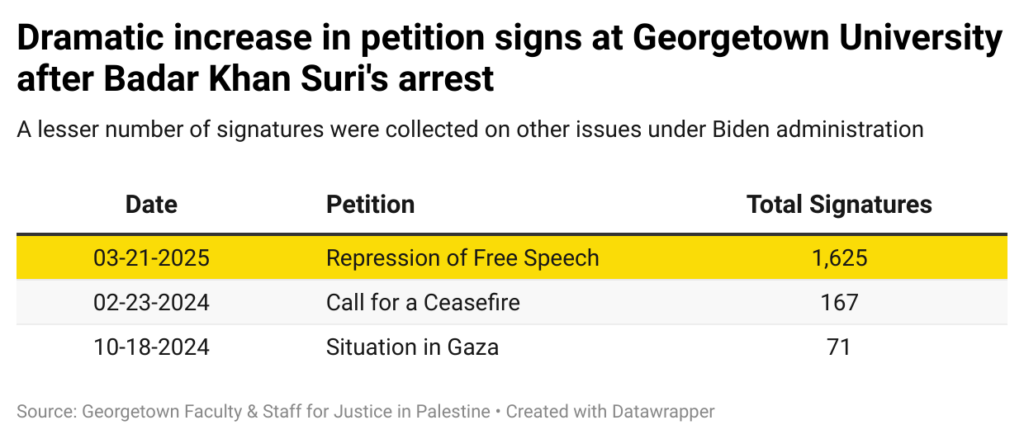
The Trump administration is also weaponizing immigration laws to muzzle political dissent. An example is the “Catch & Revoke” policy, which began as a crackdown on immigrant students. Over 1,800 international students faced revocation of their legal status for a host of reasons, from writing on the Palestinian resistance movement and dismissed charges of DUI to minor infractions.
However, legal fights are bearing some hope. Over a hundred international students in Georgia filed a lawsuit against the federal government, claiming their immigration records under SEVIS were illegally terminated, and that they were denied the right to due process under the Fifth Amendment of the US Constitution. They remained anonymous while filing the lawsuit due to fear of retaliation. The statuses of these students were temporarily reinstated by a federal judge on April 18. The Trump administration’s SEVIS record restoration order followed. However, this is temporary, as ICE is now formulating a more robust framework for SEVIS record termination.
Media Trials and Doxxing of Badar Khan Suri
In February, the National Review published a report titled ‘Georgetown’s Daughter of Hamas,’ targeting Khan Suri’s wife, Mapheze Saleh—a US citizen. The video by CAMERA on Campus doxxing Mapheze was amplified by the Israeli Embassy in Washington, DC. So far, she remains safe from authorities because of her naturalized US citizenship.
In the same month, the Philadelphia-based “think tank” Middle East Forum (MEF), known for spreading anti-Muslim propaganda, published similar articles targeting the scholar on two different platforms: Campus Watch, a project that targets pro-Palestine students, and the Zionist publication Jewish News Syndicate (JNS). Within a month of these publications, Khan Suri was arrested.
The JNS piece targeting Khan Suri relied on social media posts by the academic and his wife as evidence for being “pro-Hamas”. It also claimed that Saleh’s father is a “senior Hamas” figure. On March 20, Fox News’ Jesse Watters said, “Badar teaches at Georgetown and Trump’s trying to deport him. Democrats are freaking out. But what they won’t tell you is Badar’s tied in with terrorists. His father-in-law is Hamas.”
The claims are based on the fact that Suri’s father-in-law, Ahmed Yousef, was an adviser to Hamas leader Ismail Haniyeh at least until 2017, according to the Middle East Eye. Yousef officially served in the Haniyeh government in Gaza from 2007-14. Haniyeh was assassinated by Israeli forces in 2024 in Tehran, Iran.
In 2018, the Hindustan Times reported that Yousef was a former deputy foreign minister in the Hamas government and now heads the House of Wisdom Institute (HoW) in Gaza, which provides courses in humanitarian law and governance. In the same article, Khan Suri said, “My father-in-law left the Hamas government after its five-year term ended and there were no fresh elections.”
The Trump administration tried to weaponize a rarely used section of immigration law —the Alien Enemies Act. The law states,
“Whenever there shall be a declared war between the United States and any foreign nation or government, or any invasion or predatory incursion shall be perpetrated, attempted, or threatened against the territory of the United States, by any foreign nation or government, and the President of the United States shall make public proclamation of the event, all natives, citizens, denizens, or subjects of the hostile nation or government, being males of the age of fourteen years and upwards, who shall be within the United States, and not actually naturalized, shall be liable to be apprehended, restrained, secured and removed, as alien enemies.”
Badar’s lawyers argued this law was being misused to punish him for his political views and family background, and not for any substantiated criminal or security threat.
Dr. Nader Hashemi, director of the Alwaleed Center for Muslim-Christian Understanding and someone who worked closely with Khan Suri, thinks he is being targeted for his familial ties to Palestine. He said, “During the recent presidential election, Donald Trump repeatedly used the word ‘Palestinian’ as a slur to attack his political opponents. He did this on multiple occasions. It elicited little pushback or criticism from the Democratic Party, thus reflecting the deep roots of anti-Palestinian bigotry that inform mainstream American political culture. It is against this backdrop that a genocide can take place today in Gaza with full backing from both political parties.”
Despite Yousef’s former association with Hamas, Georgetown University is widely respected for its School of Foreign Service (SFS). The university has students from diverse backgrounds — both in the United States and abroad— whose families hold ideological perspectives that differ from the US government’s foreign policy. For instance, Scott Ritter, a former United States Marine Corps intelligence officer who, in January 2024, publicly supported Russia and addressed soldiers in Chechnya, encouraging their efforts in Ukraine, has a daughter studying at Georgetown.
Ritter has also regularly contributed to Russian state media. His daughter, Patricia Ritter, who was present on stage with him during one of his speeches and has been accused by some of being a “Russian asset,” is a student at Georgetown. Mapheze, like Patricia, is also a student at the SFS.
Yousef has not been politically active in the last decade. Nonetheless, a mere familial tie to a former Hamas member does not warrant an arrest under US laws. As for Khan Suri, the government presented no evidence of any offense in the US, let alone participation in terrorism or funding terrorist activities. Sunita Viswanath, Executive Director of the US-based NGO Hindus for Human Rights, said, “Let’s be clear: this isn’t about stopping terrorism—it’s about punishing speech. Even the most ordinary expressions of solidarity with Palestine, like sharing a post or signing a petition, are now being treated as criminal. This is a chilling McCarthy-era playbook updated for the digital age—and if it succeeds here, it won’t stop with Palestine.”
India has not made any attempt to help its detained citizens. On March 21, India’s Ministry of External Affairs spokesperson Randhir Jaiswal said, “On the question of the Indian student, Badar Khan Suri…neither the student nor the government has gotten in touch with us. If they get in touch with us, then we will see how to best engage in this particular matter.”
Meanwhile, despite India’s historical support for Palestine, the current Modi regime has strengthened its relationship with the Netanyahu government, with trade and arms ties. At the same time, Palestine solidarity protests have seen crackdowns in various parts of the country, indicating why the right-wing Indian government may not be interested in having Khan Suri’s back.
Insight into Badar Khan Suri’s Posts
Post 1: In July 2014, Khan Suri shared a clip of Hamas founder Sheikh Ahmed Yassin’s interview. He wrote, “This is what HAMAS argues. Sheikh Yaseen giving the reasons why his group is fighting for their land, which was stolen.” In the clip, Yaseen said, “We don’t hate the Jews.”

Khan Suri posted this when he was still in India. Hamas is not designated as a terrorist organization in India. It is interesting to note that, just one day before the opinion piece targeting Khan Suri was published, the Middle East Forum (MEF) released an article titled “India Must Declare Hamas a Terrorist Organization.”
Post 2: Badar shared a clip of Hamas fighters interacting gently and playfully with Israeli babies on October 13. He also wrote, “This is how Hamas dealt with kids on October 7.” According to Ynet, about 36 children were killed, and as reported by The Times of Israel, 38 children lost their lives in the attack.
Meanwhile, by the time Badar had posted this clip, Israel had killed at least 500 children, as per the Ministry of Health, Gaza. Since then, US-backed Israel has killed over 18,000 children in Gaza—this is excluding death tolls in the West Bank, Lebanon, Yemen, Syria, Iran, and Iraq. On May 19, 2025, Tom Fletcher, United Nations humanitarian chief, told the BBC that 14,000 babies could die in Gaza in the next 48 hours if aid does not reach them in time.
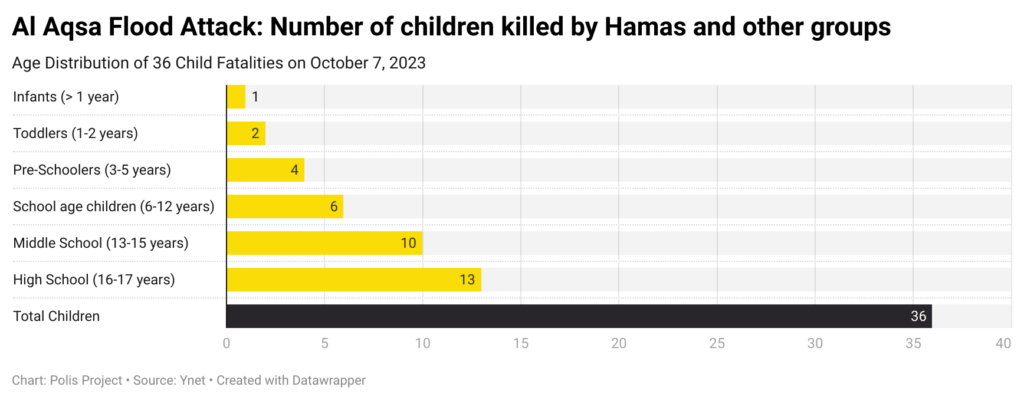
Post 3: In another post on October 13, Khan Suri said, “Three lies by Israeli occupation, no proof whatsoever of babies beheaded, rapes, or mass killings at carnival.” As per Human Rights Watch, the largest number of deaths on October 7 was at the Supernova Music Festival, where at least 364 civilians were killed by Hamas fighters and other militants.
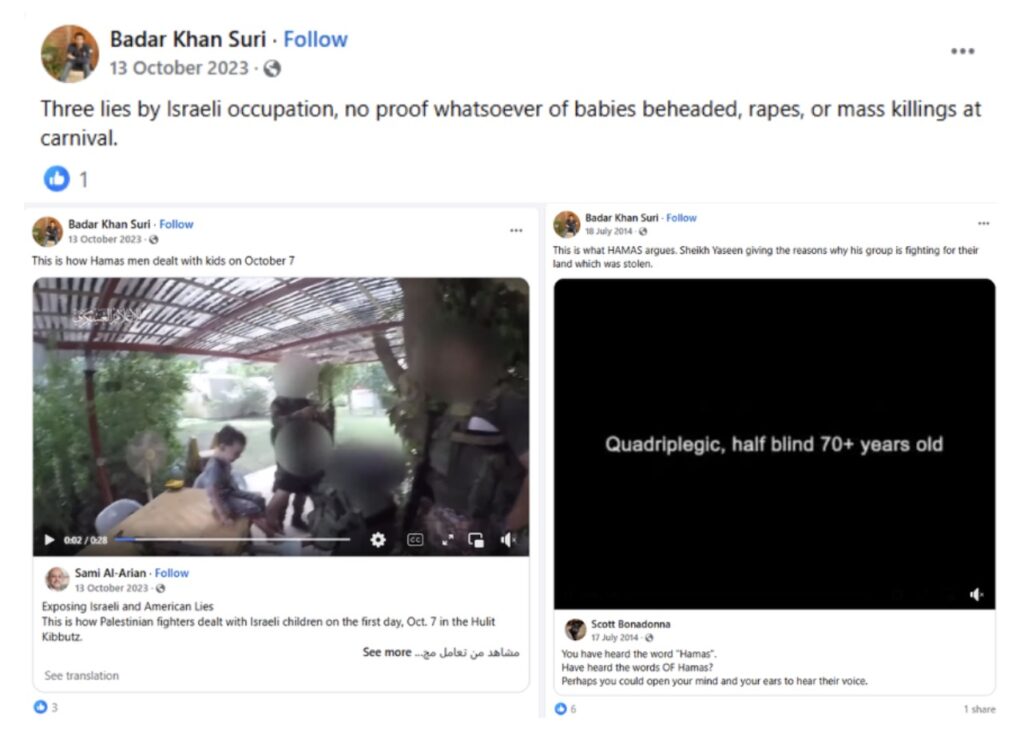
By the time he posted, at least 1,537 people had been killed in Gaza, and over 300,000 forcefully displaced. On October 11, four days after the attacks in Israel, former President Joe Biden addressed a group of Jewish community leaders. He said, “I never really thought that I would see and have confirmed pictures of terrorists beheading children.”
This was one of the major pieces of false information spread about October 7th, propagated around the world, straight from the White House. Since then, the White House has clarified that Biden never saw the photos—which can only mean that Biden lied while in office.
Another disinformation used by Israel to conduct unabated genocide in Gaza and the West Bank was regarding alleged sexual assaults on October 7. Earlier this year, in January, Moran Gez, a former lead prosecutor in Israel’s Southern District Prosecutor’s Officesaid, In the end, we don’t have any complaints[of rapes].” The Intercept also reported how The New York Times fabricated evidence for rape on October 7.
Khan Suri’s Facebook profile is now private. Even if we assume his posts were available to a wider audience at some prior point, their engagement is low—10 likes across three posts. Crucially, despite Meta’s systemic suppression of pro-Palestinian content, none of Khan Suri’s posts were removed for violating Meta’s community guidelines.
On the other hand, there are innumerable videos and posts of IDF troopers making violent TikTok videos, reported by the NYT and BBC, from Gaza while carrying on the onslaught on Palestinians. This is accompanied by Israeli government officials, journalists, and influencers making posts with genocidal intent—the UK and Sweden-based advocacy group Law for Palestine has documented over 400 such instances.
Khan Suri’s photo in The Milli Gazette with the late Palestinian Prime Minister Ismail Haniyeh is another point of contention. The image is from 2010, ‘Asian People’s Solidarity for Palestine.’ The visit was organized in response to the Israeli killing of nine humanitarian aid workers associated with the Freedom Flotilla Coalition in May 2010. Over 120 activists (50+ from India) from 17 Asian countries had joined this pro-Palestine initiative.

Based on reports from The Milli Gazette, we found that notable personalities from India have visited Gaza, including Ramon Magsaysay Award-winning social activist Sandeep Pandey and Bollywood star Swara Bhasker (then a student). At the time of this trip, Badar was a master’s student.
Feroze Mithiborwala, founder of the India Palestine Solidarity Forum, who was instrumental in organizing India activists’ envoy to Gaza, said, “Drawing inspiration from the Viva Palestina, a lifeline from ‘Britain to ‘Gaza’—the brainchild of British MP George Galloway, a group of Indian social activists aspired to reach Gaza in solidarity.”
When asked about the photo, Mithiborwala explained, “In this photo, we see former PM Ismail Haniyeh and other Indian men holding hands together as a sign of solidarity with Palestine. Not just Badar but people from across the world took pictures with Haniyeh.” He emphasized that the visit was symbolic and social in nature, aimed at expressing solidarity with the Palestinian people during a humanitarian crisis.
Another activist who visited Gaza, speaking on condition of anonymity, shared, “When I think of the Zionist lobby framing Badar as pro-Hamas or a terrorist, it shows how desperate they have become to salvage their image. Unfortunately, nothing can undo their shame of perpetuating the ongoing genocide in Palestine.”
All this notwithstanding, the key factor is that Suri’s posts are protected by the First Amendment to the US Constitution, which applies to him as a permanent resident. As the US Supreme Court has held in numerous instances, even the most offensive and hateful speech is protected by the First Amendment, unless it directly incites imminent violence. In Brandenburg v. Ohio (1969), as per Oyez (pronounced OH-yay)—a free law project from Cornell’s Legal Information Institute, Justia, and Chicago-Kent College of Law, “The Court used a two-pronged test to evaluate speech acts: (1) speech can be prohibited if it is “directed at inciting or producing imminent lawless action” and (2) it is “likely to incite or produce such action.”
Similarly, in Village of Skokie v. National Socialist Party of America (1978), as per Oyez, “The Court held that Illinois must provide strict procedural safeguards, including appellate review, to deny a stay for an injunction depriving the Nazi Party of protected First Amendment rights … Hence, the Court also treated the Nazi Party’s application for a stay as a petition for certiorari…”
The US Supreme Court has also recognized that non-citizens are entitled to First Amendment protections. In Bridges v. Wixon (1945), as per the Free Speech Center, “Justice Frank Murphy reiterated that the Bill of Rights applied both to citizens and aliens: ‘It protects them as long as they reside within the boundaries of our land. It protects them in the exercise of the great individuals rights necessary to a sound political and economic democracy. Neither injunction, fine, imprisonment nor deportation can be utilized to restrict or prevent the exercise of intellectual freedom.’”
Jameel Jaffer, director of the Knight First Amendment Institute at Columbia University, told The Polis Project, “The First Amendment provides broad protection for political speech. This means the government can’t sanction a person because of the viewpoints he expresses. The fact that speech is offensive or controversial or even false does not take it outside the protection of the First Amendment.” Speaking regarding the case of Badar Khan Suri and other political arrests starting from Mahmoud Khalil, he added, “Every court that has addressed this question over the past few weeks has come to the same conclusion: Non-citizens in the United States are entitled to the protection of the First Amendment, including in the context of deportation.”
Meanwhile, despite these robust protections, the incongruous and discriminatory attitude of the administration on free speech is well documented. Last year in April, a group of Zionist extremists entered the University of California, Los Angeles campus and violently attacked peaceful pro-Palestine protesters in the encampment for hours, injuring several people. One of the attackers was identified as Edan On, who not only roamed scot-free but also took steps to join the IDF. As per the US-based civil rights group Council on American-Islamic Relations, on April 25, Los Angeles City Attorney Hydee Feldstein Soto filed criminal charges against Edan On.
On April 27, incidents involving the harassment of two women in Brooklyn, New York, took violence against pro-Palestine protests to new heights. The incidents took place outside Chabad-Lubavitch World Headquarters in Crown Heights, where a plausible war criminal and Israeli Security Minister, Itamar Ben-Gvir, was scheduled to appear. One woman, a neighborhood resident in her 30s, was chased, kicked, spat at, and pelted with objects by a pro-Israeli mob after they mistook her for a pro-Palestinian protester. The video of the incident went viral on social media. She was subjected to chants of “Death to Arabs” and threats of sexual violence.
In a separate but related incident, another woman on the pro-Palestinian side of the protest suffered injuries, with photos showing blood streaming down her face after she was harassed by counterprotesters.
Both incidents highlight the US’s viewpoint discrimination in protecting speech.
Immigration lawyer Hassan Ahmed, one of the legal counsel for Suri, at a May 14 event at Busboys and Poets, said, “The law that is being used to persecute Dr. Suri has only been used a handful of times. It’s a relic of the Cold War, and for the first time in this administration, what is new is the way it’s been used to clamp down on free speech.”
Speaking hours before Suri arrived in Washington, DC, Ahmed described the process for their legal fight: “Unfortunately, there’s a regulation that says that anybody who is targeted by this law is subject to mandatory detention. So an immigration judge… is powerless to make a bond for release. So what do you do? You go to their boss, you go above their head, and that means going to the district court. Badar was arrested; we filed a petition in the Eastern District of Virginia. It was acknowledged by the court that his detention may well have been illegal. His detention is not a final decision on the merits. But at the very least, the general counsel said that there’s a high likelihood that we would be successful on the merits of the case.” Because of that likelihood, Suri should not be subjected to mandatory detention, he added.
Following his release, Khan Suri said in an interview to PBS News, “So these allegations, I should call them speculations or whatever, because, in the court of — in the court in front of the judge, they were not able to bring any shred of any evidence, any proof, anything. The honorable judge kept on asking, whatever you guys are talking in social media, bring something here. Nobody brought anything [sic].”
Khan Suri’s release is a definitive win against the Trump administration’s crackdown on speech. But it is still not conclusive—his next immigration hearing is scheduled for June 3, and subsequent ones will decide on his deportation. Until then, his J-1 visa status likely remains revoked; both Georgetown University and his legal team are working to change that. A week before his release, in a letter dedicated to his lawyers, Suri wrote, “My only ‘crimes’ making me a ‘national security threat’ are my marriage to a United States citizen of Palestinian origin and my support for the Palestinian cause… We will reject authoritarianism and oppose this travesty of justice. Be courageous, because courage is contagious.”



